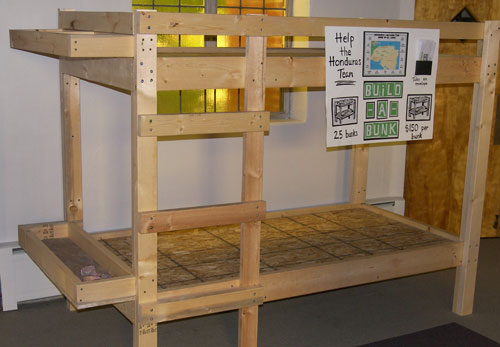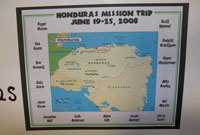June 16, 2008
|
Several groups are preparing to head overseas.
June 18. A group from College Park Church (Huntington, Ind.) travels to Honduras, where they will build bunk beds at the camp outside of La Ceiba. Roger Vezeau, associate pastor at College Park, is leading this all-adult group.
June 19-July 2. A group of 26 teens and adults will conduct an English camp in Kutno, Poland. This is the fourth year a group has ministered in Poland. This year’s team includes people from:
- King Street Church (Chambersburg, Pa.).
- Criders UB(Chambersburg, Pa.)
- Cochranton Community Church (Cochranton, Pa.)
- Lancaster UB (Lanaster, Ohio)
- First UB (Holly Hill, Fla.).
Jody Sarno, who comes out of King Street Church (Chambersburg, Pa.), is the team leader. The team will partner with a group from Scotland, as they did last year.
June 20-28. A 15-person medical team travels to the Copan region of Honduras, under the leadership of Robert and Fonda Cassidy, from Mount Olivet UB in Mt. Solon, Va. The team includes people from UB churches in Virginia, West Virginia, Pennsylvania, Ohio, and Indiana. The group includes registered nurses, an EMT, a chiropractor, and various support staff who will help with medical records and other duties. (Fonda Cassidy is a trauma care nurse and does high-risk deliveries.)
The group will start in Santa Rosa, the largest city in the Copan region. Each day, they will conduct a mobile clinic in association with a different United Brethren church. They will hold at least five clinics. Donna Hollopeter, associate director of Global Ministries, is a member of this team.
July 12. Four persons from Heritage UB (Dansville, Mich.), under the leadership of senior pastor Cal Hodgson, will do construction in the Copan region of Honduras.
July 18-August 3. For the second year, a team representing Huntington University and Global Ministries will conduct an English camp for English teachers in Zuhai, a major city in southern China.

 While we refer to them as the Philippine National Conference, they are known locally as Looking Unto Jesus.
While we refer to them as the Philippine National Conference, they are known locally as Looking Unto Jesus.
 They’ll tackle a variety of projects, the main one being building bunks at the new conference camp outside of La Ceiba.
They’ll tackle a variety of projects, the main one being building bunks at the new conference camp outside of La Ceiba.